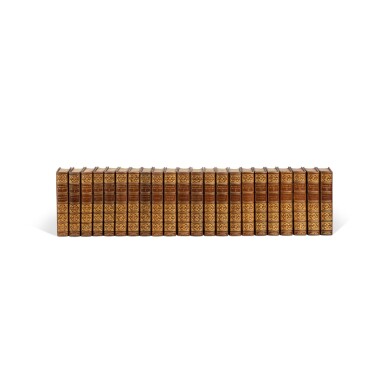EMERSON, Ralph Waldo (1803-1882). Autograph manuscript, a portion of an essay or lecture, possibly his "Morals," delivered in Boston at the Freeman Place Church of the Disciples, 4 December 1859. N.p., n.d. [Concord, early 1859?]. 2 pages, 4to, in brown ink on recto and verso of a single sheet of lined paper, evidence of former mounting in left margin . Blue morocco folding case. "'TIS WONDERFUL WHERE THE MORAL ELEMENT COMES FROM...": A RARE EMERSON PHILOSOPHICAL MANUSCRIPT A thoughtful consideration of the sources of morality and the tendency of the "sensuous & industrial activity" of the modern world to lead mankind into a "kingdom of illusions" in which the deepest moral and religious impulses are dulled or dismissed. "'Tis wonderful where the moral element comes from. Strength enters according to its presence. There are no bounds to its power. If it have limits, we have not found them. It domesticates. They are not our friends who are of our household, but they who think & see with us." Emerson acknowledges that the obstacles of the industrial world present a barrier to moral growth: "I know there are transition periods when the old forms rattle, & the new delay to appear; when sensuous & industrial activity has materialized the mind & the mind haughty with its sciences disdains the religious forms as childish." He concludes, however, that an individual who achieves moral growth by escaping the burdens of the material world, will achieve spritual salvation: "'Tis a doctrine of unspeakable comfort. He that plants his foot here, passes out of the Kingdom of illusions. Others may well suffer at the hideous picture of crime with which earth is filled, & the life of society threatened. 'Until man is able to compress the ether like leather, there will be no end of misery, except through the knowledge of god,' say the Hindoos." The content of this manuscript passage, complete in itself, tantalizingly parallels that of Emerson's lecture "Morals," written 26 April 1859 and delivered 4 December 1859 at the Freeman Place Chapel in Boston (Emerson's autograph ms. at Harvard: Houghton Library Ms Am 1280,204 (9)). The present leaf may represent a portion of the text deleted by Emerson from the manuscript of the completed address. See Later Lectures of Ralph Waldo Emerson, 1843-1871 , vol.2. Rare. Examples of Emerson's prose writings, even fragmentary are rarely offerd for sale, as most of these are in permanent instiututional collections.
EMERSON, Ralph Waldo (1803-1882). Autograph manuscript, a portion of an essay or lecture, possibly his "Morals," delivered in Boston at the Freeman Place Church of the Disciples, 4 December 1859. N.p., n.d. [Concord, early 1859?]. 2 pages, 4to, in brown ink on recto and verso of a single sheet of lined paper, evidence of former mounting in left margin . Blue morocco folding case. "'TIS WONDERFUL WHERE THE MORAL ELEMENT COMES FROM...": A RARE EMERSON PHILOSOPHICAL MANUSCRIPT A thoughtful consideration of the sources of morality and the tendency of the "sensuous & industrial activity" of the modern world to lead mankind into a "kingdom of illusions" in which the deepest moral and religious impulses are dulled or dismissed. "'Tis wonderful where the moral element comes from. Strength enters according to its presence. There are no bounds to its power. If it have limits, we have not found them. It domesticates. They are not our friends who are of our household, but they who think & see with us." Emerson acknowledges that the obstacles of the industrial world present a barrier to moral growth: "I know there are transition periods when the old forms rattle, & the new delay to appear; when sensuous & industrial activity has materialized the mind & the mind haughty with its sciences disdains the religious forms as childish." He concludes, however, that an individual who achieves moral growth by escaping the burdens of the material world, will achieve spritual salvation: "'Tis a doctrine of unspeakable comfort. He that plants his foot here, passes out of the Kingdom of illusions. Others may well suffer at the hideous picture of crime with which earth is filled, & the life of society threatened. 'Until man is able to compress the ether like leather, there will be no end of misery, except through the knowledge of god,' say the Hindoos." The content of this manuscript passage, complete in itself, tantalizingly parallels that of Emerson's lecture "Morals," written 26 April 1859 and delivered 4 December 1859 at the Freeman Place Chapel in Boston (Emerson's autograph ms. at Harvard: Houghton Library Ms Am 1280,204 (9)). The present leaf may represent a portion of the text deleted by Emerson from the manuscript of the completed address. See Later Lectures of Ralph Waldo Emerson, 1843-1871 , vol.2. Rare. Examples of Emerson's prose writings, even fragmentary are rarely offerd for sale, as most of these are in permanent instiututional collections.















Testen Sie LotSearch und seine Premium-Features 7 Tage - ohne Kosten!
Lassen Sie sich automatisch über neue Objekte in kommenden Auktionen benachrichtigen.
Suchauftrag anlegen